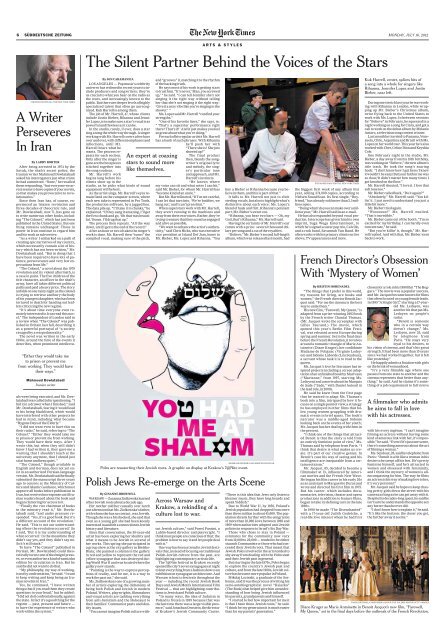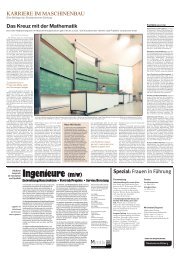Fußball-Wm 2006 angeblich gekauft
Fußball-Wm 2006 angeblich gekauft
Fußball-Wm 2006 angeblich gekauft
Erfolgreiche ePaper selbst erstellen
Machen Sie aus Ihren PDF Publikationen ein blätterbares Flipbook mit unserer einzigartigen Google optimierten e-Paper Software.
6 sÜddeutsche zeitung MONDAY, JULY 16, 2012<br />
CHESTER HIGGINS JR./THE NEW YORK TIMES<br />
A Writer<br />
Perseveres<br />
In Iran<br />
By LARRY ROHTER<br />
After being arrested in 1974 by the<br />
Savak, the shah’s secret police, the<br />
Iranian writer Mahmoud Dowlatabadi<br />
asked his interrogators just what crime<br />
he had committed. “None,” he recalled<br />
them responding, “but everyone we arrest<br />
seems to have copies of your novels,<br />
so that makes you provocative to revolutionaries.”<br />
Since then Iran has, of course, experienced<br />
an Islamic revolution and<br />
three decades of theocratic rule, and<br />
Mr. Dowlatabadi, now 71, has gone on<br />
to write numerous other books, including<br />
“The Colonel,” which has just been<br />
published in the United States. But one<br />
thing remains unchanged: Those in<br />
power in Iran continue to regard him<br />
and his work as subversive.<br />
“As a writer I embarked on a path of<br />
creating epic narratives of my country,<br />
which necessarily contain a lot of history<br />
which has not been written,” Mr.<br />
Dowlatabadi said. “But in doing that I<br />
have been required to have lots of patience,<br />
perseverance and very few expectations<br />
from life.”<br />
“The Colonel,” a novel about the 1979<br />
revolution and its violent aftermath, is<br />
a case in point. The five children of the<br />
title character, an officer in the shah’s<br />
army, have all taken different political<br />
paths and paid a heavy price. The story<br />
unfolds on one rainy night as the colonel<br />
is trying to retrieve and bury the body<br />
of his youngest daughter, who has been<br />
tortured to death for handing out leaflets<br />
criticizing the new regime.<br />
“It’s about time everyone even remotely<br />
interested in Iran read this novel,”<br />
The Independent of London said in<br />
a review when “The Colonel” was published<br />
in Britain last fall, describing it<br />
as a powerful portrayal of “a society<br />
ravaged by a warped morality.”<br />
The novel was written in the early<br />
1980s, around the time of the events it<br />
describes, when prominent intellectu-<br />
“Either they would take me<br />
to prison or prevent me<br />
from working. They would have<br />
their ways.”<br />
Mahmoud dowlatabadi<br />
Iranian writer<br />
als were being executed, and Mr. Dowlatabadi<br />
was called in for questioning. “I<br />
hid it in a drawer when I finished,” said<br />
Mr. Dowlatabadi, fearing it would lead<br />
to his being blacklisted, which would<br />
have interfered with other projects he<br />
had in mind, including what became<br />
“Bygone Days of the Elderly.”<br />
“I did not want even to have this on<br />
their radar,” he said, referring to “The<br />
Colonel.” “Either they would take me<br />
to prison or prevent me from working.<br />
They would have their ways. After I<br />
wrote this, but when they still didn’t<br />
know I had written it, they gave me a<br />
warning that I shouldn’t teach at the<br />
university anymore, that I should just<br />
sit at home and keep quiet. ”<br />
“The Colonel,” though available in<br />
English and German, does not yet exist<br />
in an authorized Persian-language<br />
version. Mr. Dowlatabadi said he finally<br />
submitted the manuscript three years<br />
ago to censors at the Ministry of Culture<br />
and Islamic Guidance, which must<br />
approve all books before publication in<br />
Iran, but received no response until Iranian<br />
readers heard about the book and<br />
began clamoring for access to it.<br />
“Finally the vice chairman of books<br />
in the ministry read it,” Mr. Dowlatabadi<br />
said, “and under pressure responded:<br />
‘Yes, it’s a good book. But it’s<br />
a different account of the revolution.’<br />
He said, ‘This is not our understanding<br />
of how the revolution occurred.’ So<br />
I said, ‘But it is my understanding of<br />
what occurred.’ In the meantime they<br />
didn’t say yes, and they didn’t say no.<br />
So it’s still stuck.”<br />
To have “The Colonel” published in<br />
Persian, Mr. Dowlatabadi could theoretically<br />
turn to one of the émigré presses,<br />
or even authorize a kind of samizdat<br />
edition for circulation in Iran. But he<br />
said he did not want to do that.<br />
“My philosophy, my way of working,<br />
is not by confrontation,” he said. “I want<br />
to keep writing and keep being an Iranian<br />
novelist in Iran.”<br />
Yes, he continued, “I have written<br />
things that if you read them they create<br />
questions in your head,” but he added:<br />
“I did not do it confrontationally, against<br />
the state. In fact it’s a good thing for the<br />
regime — past, present and future —<br />
to have the experience of writers who<br />
work within the system.”<br />
By JON CARAMANICA<br />
LOS ANGELES — Pop music’s celebrity<br />
universe has widened in recent years to include<br />
producers and songwriters; they’re<br />
as crucial to what you hear on the radio as<br />
the stars, and increasingly known to the<br />
public. But there are deeper levels of highly<br />
specialized talent that often go unrecognized.<br />
Kuk Harrell is among them.<br />
The job of Mr. Harrell, 47, whose clients<br />
include Justin Bieber, Rihanna and Jennifer<br />
Lopez, is to make sure a star’s vocal is as<br />
powerful and flawless as it can be.<br />
In the studio, rarely, if ever, does a star<br />
sing a song the whole way through. A singer<br />
working with Mr. Harrell covers a few bars<br />
over and over, with different emphases and<br />
inflections, until Mr.<br />
Harrell hears what he<br />
wants. The process re-<br />
peats for each section.<br />
Only after the singer is<br />
gone are the best pieces<br />
stitched together into<br />
the song you hear.<br />
Mr. Harrell’s work<br />
begins long before his<br />
clients show up in the<br />
studio, as he picks what kinds of sound<br />
equipment will be best.<br />
As the artist sings, Mr. Harrell’s eyes remain<br />
fixed on the computer screen, where<br />
each new take is represented in Pro Tools,<br />
the production software, by a jagged line.<br />
The data pile up. “I’ll take it in chunks,” he<br />
explained. “If they sang it amazing, I’ll get<br />
the first chunk and go, ‘Oh that was beautiful.’<br />
Boom. I’ll drag that up.”<br />
The process then repeats. “All the way<br />
down, until I get to the end of the record.”<br />
After an hour or two of takes the singer’s<br />
work is done. Mr. Harrell then “tunes” the<br />
compiled vocal, making sure of the pitch,<br />
By GINANNE BROWNELL<br />
WARSAW — Zuzanna Ziolkowska learned<br />
of her Jewish roots about a decade ago.<br />
Her mother told her casually over lunch<br />
one afternoon that Ms. Ziolkowska’s father,<br />
with whom she has no contact, was Jewish.<br />
Though she was a bit shocked, she said that<br />
even as a young girl she had been keenly<br />
interested in and felt a connection to Jewish<br />
history and literature.<br />
Since that conversation, the 30-year-old<br />
artist has been exploring her identity and<br />
what it means to be Jewish in several of<br />
her works. This spring she participated in<br />
a group show at the city gallery in Bielsko-<br />
Biala; she painted a column in the gallery<br />
in red and yellow to represent the red and<br />
yellow synagogue that was destroyed during<br />
World War II and was located where the<br />
gallery now stands.<br />
“Painting is the way to express perceptions<br />
of reality, and for me, it is a way to<br />
work the past out,” she said.<br />
Ms. Ziolkowska is one of a growing number<br />
of artists exploring the dichotomy of<br />
being both Polish and Jewish in modern<br />
Poland. Writers, playwrights, filmmakers<br />
and visual artists are tackling everything<br />
from anti-Semitism and the Holocaust to<br />
their families’ Communist pasts and identity<br />
issues.<br />
“You cannot imagine Polish culture with-<br />
and “grooves” it, matching it to the rhythm<br />
of the backing track.<br />
He says most of his work is getting stars<br />
to trust him. “It’s never, ‘Man, you screwed<br />
up,’ ” he said. “I can tell Jennifer she’s not<br />
singing it the right way without telling<br />
her that she’s not singing it the right way:<br />
‘Give it a sexy vibe like you’re singing in the<br />
shower.’ ”<br />
Ms. Lopez said Mr. Harrell “can find your<br />
strengths.”<br />
“One of his favorite lines,” she says, is:<br />
“ ‘That’s a superstar performance right<br />
there! That’s it!’ And it just makes you feel<br />
so great about what you’re doing.”<br />
For each of his regular artists Mr. Harrell<br />
has a bank of such phrases. With Rihanna<br />
he’ll push her with<br />
“There she is! She just<br />
showed up!”<br />
The final product<br />
then, blends the songwriter’s<br />
original lyric<br />
and melody, the singer’s<br />
particular tone<br />
and approach, and Mr.<br />
Harrell’s instincts.<br />
“He knows where<br />
my voice can sit and what notes I can hit,”<br />
said Mr. Bieber, for whom Mr. Harrell has<br />
“become kind of an uncle.”<br />
But Mr. Harrell noted, “If I’m not careful,<br />
I can let that turn into, ‘We’re buddies, we<br />
hang out,’ and I can’t press him.”<br />
When superstars work with Mr. Harrell,<br />
they aren’t running to the machines and<br />
away from their own voices. Rather, they’re<br />
trying to ensure that they sound as engaged<br />
and alive as possible.<br />
“We want to enhance the artist’s authenticity,”<br />
said Chris Hicks, who was executive<br />
vice president at Island Def Jam, home to<br />
Mr. Bieber, Ms. Lopez and Rihanna. “You<br />
out Jewish culture,” said Pawel Passini, a<br />
Lublin-based director and playwright. “I<br />
think most people are conscious of that; the<br />
problem is how to say it and let people deal<br />
with it.”<br />
One way has been a trend in Jewish festivals<br />
that, instead of focusing on traditional<br />
Polish-Jewish culture from the past, are<br />
highlighting contemporary artistic life.<br />
The 7@Nite festival in Krakow recently<br />
opened the city’s seven synagogues at night<br />
to host everything from a fashion show to an<br />
exhibition on synagogue architecture. And<br />
Warsaw is host to festivals throughout the<br />
year — including the recent Jewish Book<br />
Days and Jewish Motifs International Film<br />
Festival — that are highlighting contributions<br />
to Jewish and Polish culture.<br />
“In many ways, the idea of Judaism in<br />
Poland is frozen in 1939 because that was<br />
the last time there was a large visible presence,”<br />
said Jonathan Ornstein, the director<br />
of Krakow’s Jewish Community Center.<br />
arts & styles<br />
The Silent Partner Behind the Voices of the Stars<br />
An expert at coaxing<br />
stars to sound more<br />
like themselves.<br />
buy a Bieber or Rihanna because you believe<br />
in them, and this is part of that.”<br />
It falls to Mr. Harrell not just to elicit<br />
sterling vocals, but also to highlight what’s<br />
distinctive about each voice: Ms. Lopez’s<br />
blend of husk and flirt, Rihanna’s petulant<br />
purr, Mr. Bieber’s sweet coo.<br />
“Rihanna, you hear two bars — Oh, my<br />
God, that’s Rihanna,” Mr. Harrell said.<br />
Having the certainty of Mr. Harrell’s ear<br />
comes with a price: several thousand dollars<br />
per song and a cut of the royalties.<br />
“Believe,” Mr. Bieber’s second full-length<br />
album, which was released last month, had<br />
MONIKA BLEDOWSKA AND MARCIN FRANCZAK<br />
Poles are reasserting their Jewish roots. A graphic on display at Krakow’s 7@Nite event.<br />
Polish Jews Re-emerge on the Arts Scene<br />
Across Warsaw and<br />
Krakow, a rekindling of a<br />
culture lost to war.<br />
“There is this idea that Jews only listen to<br />
klezmer music, they have long beards and<br />
speak Yiddish.”<br />
Due to World War II, by 1950, Poland’s<br />
Jewish population had dropped from more<br />
than three million to about 45,000. The population<br />
shrank further with the emigration<br />
of more than 10,000 Jews between 1968 and<br />
1969 when authorities adopted anti-Jewish<br />
policies in response to Israel’s Six Day War.<br />
Those who chose to stay in Poland —<br />
estimates for the community now vary<br />
from 10,000 to 20,000 — tended to be either<br />
staunch Communists or those who had concealed<br />
their Jewish roots. That meant that<br />
Jewish Poles involved in the arts tended to<br />
shy away from dealing with the Holocaust<br />
and their Jewish past in general.<br />
But starting in the late 1970s, Poles began<br />
to explore the country’s Jewish past and<br />
culture, and from the late 1980s, Jewish culture<br />
has become more popular in Poland.<br />
Mikolaj Lozinski, a graduate of the Sorbonne,<br />
said it was the process of writing his<br />
semi-autobiographical novel “Ksiazka”<br />
(The Book) that helped give him an understanding<br />
of how being Jewish influenced<br />
his parents, grandparents and himself.<br />
“I started to feel how important for me it<br />
is that I have those Jewish roots,” he said.<br />
“I think for my generation it is much easier<br />
than for my parents’ generation.”<br />
STEPHANIE DIANI FOR THE NEW YORK TIMES<br />
the biggest first week of any album this<br />
year, selling 374,000 copies, according to<br />
Nielsen SoundScan. Its first single, “Boyfriend,”<br />
has already sold more than 2.5 million<br />
copies.<br />
“Doing what I do you can make over a million<br />
a year,” Mr. Harrell said in an e-mail.<br />
He has also expanded beyond vocal production.<br />
Interscope has given him his own<br />
imprint, Suga Wuga Entertainment, to<br />
which he’s signed a sister pop trio, Calvillo,<br />
and a rock band, Savannah Van Band. He<br />
often works with his primary clients on live<br />
shows, TV appearances and more.<br />
By KRISTIN HOHENADEL<br />
“The things that I prefer in this world,<br />
my reasons for living, are books and<br />
women,” the French director Benoît Jacquot<br />
said. “For me the cinema is the best<br />
way to unite them.”<br />
His new film, “Farewell, My Queen,” is<br />
adapted from a prize-winning 2002 book<br />
by the French writer Chantal Thomas.<br />
(Mr. Jacquot wrote the screenplay with<br />
Gilles Taurand.) The movie, which<br />
opened this year’s Berlin Film Festival,<br />
was released across Europe during<br />
spring and summer. Set in the final days<br />
before the French Revolution, it revolves<br />
around a romantic triangle of Marie Antoinette<br />
(Diane Kruger), her confidante<br />
Madame de Polignac (Virginie Ledoyen)<br />
and Sidonie Laborde (Léa Seydoux),<br />
a servant whose task it is to read to the<br />
queen.<br />
Mr. Jacquot’s love for literature has inspired<br />
projects including a screen adaptation<br />
of an unfinished book by Marivaux<br />
(“Marianne,” from 1997, starring Ms.<br />
Ledoyen) and a movie about the Marquis<br />
de Sade (“Sade,” with Daniel Auteuil in<br />
the lead role, in 2000).<br />
He said he knew from the first page<br />
that he wanted to adapt Ms. Thomas’s<br />
book into a film, intrigued by how it focuses<br />
on a single point of view, a strategy<br />
he has employed in other films that follow<br />
young women grappling with dramatic<br />
events in brief spans. The book’s<br />
narrator was a middle-aged Sidonie<br />
looking back on the events of her youth;<br />
Mr. Jacquot has her dealing with them in<br />
the present.<br />
“I think one of the things that attracted<br />
Benoît is that the story is told from<br />
an entirely feminine point of view,” Ms.<br />
Thomas said by telephone from Paris. “I<br />
think that desire is what makes us create.<br />
It’s part of our creative genius. In<br />
Benoît’s case his way of seeing and his<br />
intelligence are inseparable from a certain<br />
eroticism.”<br />
Mr. Jacquot, 65, decided to become a<br />
filmmaker at 13, influenced by American<br />
movies and the French New Wave.<br />
He began his film career in his early 20s<br />
as an assistant to Marguerite Duras and<br />
wrote and directed his first film in 1975.<br />
But his career, which includes documentaries,<br />
television, theater and opera<br />
productions in addition to feature films,<br />
began to take its defining turn in the late<br />
1980s.<br />
In 1990 he made “The Disenchanted”<br />
with a 17-year-old Judith Godrèche, a<br />
real-life love interest whom he had first<br />
Kuk Harrell, center, splices bits of<br />
a song into a whole for singers like<br />
Rihanna, Jennifer Lopez and Justin<br />
Bieber, near left.<br />
During one stretch last year he was working<br />
with Rihanna in London, while wrapping<br />
up Mr. Bieber’s Christmas album,<br />
twice flying back to the United States to<br />
work with Ms. Lopez. In between sessions<br />
for “Believe” in February, he squeezed in a<br />
night working on a song for Ciara, and got a<br />
call to work on the debut album by Melanie<br />
Amaro, a television song contest winner.<br />
Last month he traveled to Panama, Venezuela,<br />
Chile, Argentina and Brazil with Ms.<br />
Lopez on her world tour. This year he’s also<br />
worked with Cher, Celine Dion and Keyshia<br />
Cole.<br />
One February night in the studio, Mr.<br />
Bieber, a day away from his 18th birthday,<br />
was working on “Believe,” the new album’s<br />
title track. He took the song’s soaring<br />
hook: “I don’t know how I got here/I knew<br />
it wouldn’t be easy/But your faith in me was<br />
so clear/It didn’t matter how many times I<br />
got knocked on the floor.”<br />
Mr. Harrell shouted, “I love it. I love that<br />
soft tone too.”<br />
Mr. Bieber called back, “Do it again?”<br />
“Absolutely,” Mr. Harrell said. “You killin’<br />
it. I just need to understand you just a<br />
little bit more.”<br />
Mr. Bieber tried again.<br />
“Wooooooo!” Mr. Harrell exulted.<br />
“That’s incredible.”<br />
Mr. Bieber came out of the booth. “I’m so<br />
excited for my birthday, I can hardly even<br />
concentrate,” he said.<br />
“But you’re killin’ it, though,” Mr. Harrell<br />
replied. And with that, Mr. Bieber went<br />
back to work.<br />
French Director’s Obsession<br />
With ‘Mystery of Women’<br />
chosen for a role in his 1988 film “The Beggars.”<br />
The movie was a popular success,<br />
and Mr. Jacquot became known for films<br />
that often focused on young female leads.<br />
In 1995 “A Single Girl,” starring a 17-yearold<br />
Ms. Ledoyen, was<br />
another hit that put Ms.<br />
Ledoyen on people’s<br />
radar.<br />
“Benoît is someone<br />
who in a certain way<br />
doesn’t change,” Ms.<br />
Ledoyen, now 35, said<br />
by telephone from<br />
Paris. “He stays very<br />
loyal to his desires, to<br />
his vision of cinema, and that’s his great<br />
strength. It had been more than 15 years<br />
since we had worked together, but it felt<br />
like yesterday.”<br />
He happily admits a fixation with girls<br />
on the brink of womanhood.<br />
“It’s a very filmable age where one<br />
passes from one state to another and the<br />
cinema represents that better than anything,”<br />
he said. And he claims it’s something<br />
of a job requirement to fall in love<br />
A filmmaker who admits<br />
he aims to fall in love<br />
with his actresses.<br />
with his every ingénue. “I can’t imagine<br />
filming an actress without having some<br />
kind of amorous link with her, it’s impossible,”<br />
he said. “Even if it’s just one scene,<br />
there’s something amorous about the act<br />
of filming a woman.”<br />
Ms. Seydoux, 26, said by telephone from<br />
Paris: “Benoît is a bit like a woman in his<br />
desire to be swept off his feet. He’s pretty<br />
feminine himself, and he’s attracted to<br />
women and obsessed with femininity,<br />
and I think the mystery of women is allencompassing<br />
for him. The way he films<br />
an actress is his way of making love to her,<br />
it’s very personal.”<br />
Mr. Jacquot said he hopes to keep chasing<br />
pretty girls down the street with his<br />
camera as long as he can get away with it.<br />
Despite his decades-long quest, he said he<br />
isn’t sure he understands the opposite sex<br />
any better than he ever did.<br />
“I don’t know how to explain it,” he said.<br />
“It’s like the horizon: the closer you get,<br />
the farther away it seems.”<br />
CAROLE BETHUEL/COHEN MEDIA GROUP; TOP, VALERIE MACON/GETTY IMAGES<br />
Diane Kruger as Marie Antoinette in Benoît Jacquot’s new film, “Farewell,<br />
My Queen,” set in the final days before the outbreak of the French Revolution.
















